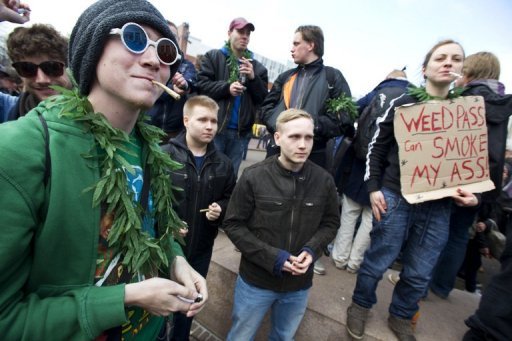
Keen to stub out an era of dope tourism, the Netherlands on Tuesday starts restricting cannabis sales in the country’s south to residents only, despite opposition from pro-pot lobby groups.
Famous for decades for its laid-back attitude to marijuana, the Netherlands will now require so-called coffee shops in some regions to only sell to signed-up members who live in the country, not to foreign visitors.
The tougher rules, set to take effect nationwide from next year, effectively turn coffee shops into private clubs with no more than 2,000 members, who must be over 18 and legal residents of the country.
Starting Tuesday in three provinces, coffee shops will have to turn away those without the so-called “cannabis cards”, which allow locals and foreigners living in the country to enter and light up.
A last-minute challenge seeking to declare the law discriminatory by coffee shop owners — including in the Limburg, North-Brabant and Zeeland provinces on the Belgian and German borders — failed last week.
Coffee shop owners say the ban on foreigners will cut into profits. But many local residents have welcomed the change, saying they have had enough of traffic jams, nocturnal disturbances and drug pushers catering to the millions of foreign visitors drawn by the relaxed cannabis laws.
The southern city of Maastricht, a popular destination for some 1.4 million “drug tourists” every year from Germany, France and Belgium, said last week it was ready to enforce the “weed-pass” legislation.
It said in a press release that from May 1 “Maastricht adjusts its policy on coffee shops” and warned that violators face administrative sanctions, including having their business shut down.
Some coffee shops have already signalled they intend to break the law.
The centre-right government of Prime Minister Mark Rutte has for years prepared the ground for making the “cannabis card” obligatory when visiting one of the country’s 670 licensed coffee shops.
Although cannabis is technically illegal in the Netherlands, the country in 1976 decriminalised possession of less than five grams (0.18 ounces) of the substance under a so-called tolerance policy.
In neighbouring Belgium, Home Affairs Minister Joelle Milquet on Monday warned the country was ready to take action against drug tourists, saying: “Slipping in an illegal supply will not be tolerated in Belgium.”
Dutch authorities have also set up large signs over the weekend announcing the ban under a slogan that read: “New rules, no drugs,” while the police presence has been increased on both sides of the border.

